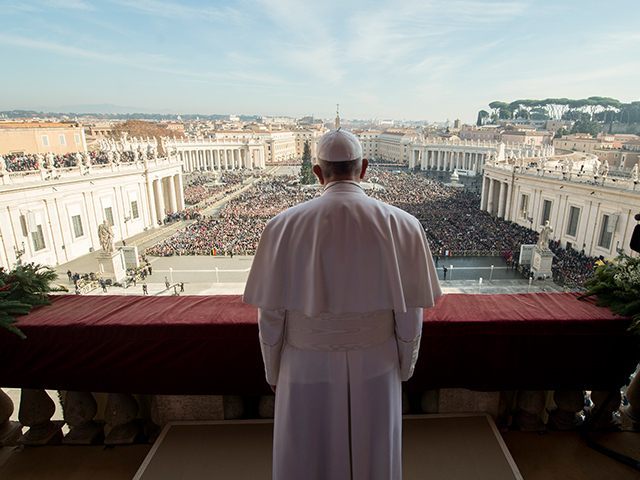In the Pope’s annual Christmas message to the world that traditionally highlights the gravest problems facing humanity, Francis repeatedly underscored the evils of terrorism, especially in areas dominated by the Islamic State, and completely skipped over environmental concerns that have often figured prominently in his discourses.
This year’s papal message delivered at noon on Christmas day, called “urbi et orbi”—to the city (of Rome) and to the world—focused on the people hardest hit by wars and terrorism, in particular the Middle East.
Precisely “where the incarnate Son of God came into the world,” Francis said, “tensions and violence persist, and peace remains a gift to be implored and built.”
In his prayer for peace, Pope Francis explicitly referred to the Israeli-Palestinian conflict, the ongoing war in Syria, and the atrocities wrought by Islamic terrorists in Iraq, Libya, Yemen, and sub-Saharan Africa.
“May the attention of the international community be unanimously directed to ending the atrocities which in those countries [Israel, Palestine, Syria], as well as in Iraq, Libya, Yemen and sub-Saharan Africa, even now reap numerous victims, cause immense suffering and do not even spare the historical and cultural patrimony of entire peoples,” he said.
As he has done in numerous occasions, the Pope reached out to persecuted Christians throughout the world. “To our brothers and sisters who in many parts of the world are being persecuted for their faith,” he said, “may the Child Jesus grant consolation and strength.” He then put aside his notes for a moment and added extemporaneously, “They are our martyrs of today.”
Francis also directly referenced recent terrorist attacks, every one of which was carried out by radical jihadists, as causes of particular concern for the entire world.
“My thoughts also turn to those affected by brutal acts of terrorism, particularly the recent massacres which took place in Egyptian airspace, in Beirut, Paris, Bamako and Tunis,” he said.
The Pope also listed other areas of concern, specifically the Democratic Republic of Congo, Burundi, Ukraine and South Sudan, praying that dialogue might lead to “a strengthened common commitment to the building of civil societies.”
Francis said that on the feast commemorating the birth of Jesus, humanity must turn to Him as the remedy for all its ills, especially those that seem most desperate.
“He alone, he alone can save us. Only God’s mercy can free humanity from the many forms of evil, at times monstrous evil, which selfishness spawns in our midst. The grace of God can convert hearts and offer mankind a way out of humanly insoluble situations,” he said.
“Where God is born, hope is born. He brings hope. Where God is born, peace is born. And where peace is born, there is no longer room for hatred and for war,” he said.
Francis also spoke of the “great numbers of men and woman are deprived of their human dignity” who like the child Jesus, suffer cold, poverty, and rejection. “May our closeness today be felt by those who are most vulnerable, especially child soldiers, women who suffer violence, and the victims of human trafficking and the drug trade,” he said.
Conspicuous by its absence was any reference to climate change or environmental concerns, despite the fact that less than a month ago the Pope said that humanity was “on the brink of suicide” because of global warming and that the COP21 climate meetings in Paris might be the last chance for mankind to avert environmental destruction.
In his address, Francis did reach out to “all those fleeing extreme poverty or war,” and praised those who “generously work to provide assistance and welcome to the numerous migrants and refugees, helping them to build a dignified future for themselves and for their dear ones, and to be integrated in the societies which receive them.”
“Where God is born, mercy flourishes,” Francis said. “Mercy is the most precious gift which God gives us, especially during this Jubilee year in which we are called to discover that tender love of our heavenly Father for each of us.”
Follow Thomas D. Williams on Twitter @tdwilliamsrome

COMMENTS
Please let us know if you're having issues with commenting.